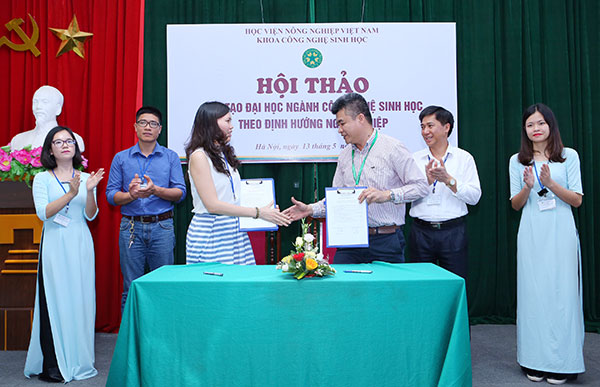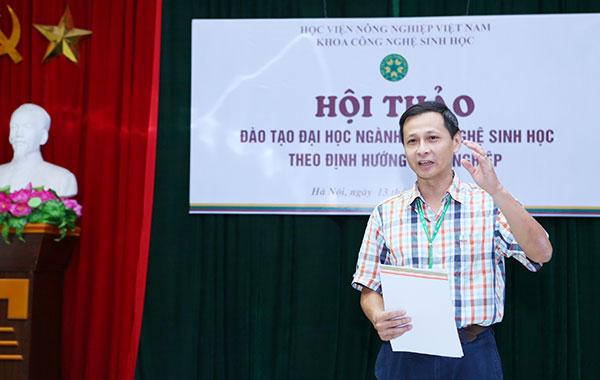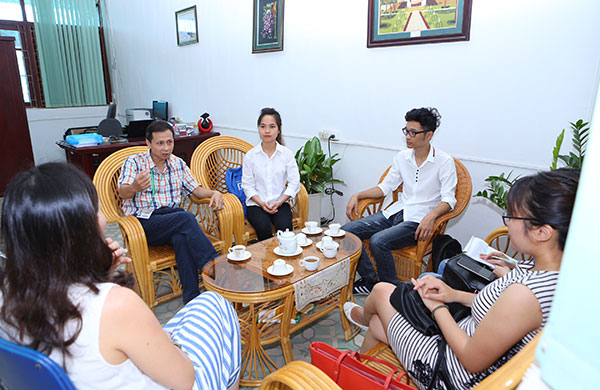Cooperation to raise next generation of agri-biotech experts: Monsanto-VNUA
 |
Encouraging learning and research
In October 2014, Monsanto and VNUA signed the agreement to launch the Monsanto-VNUA scholarship. Through this programme, Monsanto committed VND1.5 billion over five years for the scholarship fund. The scholarship is available for students of biotechnology from the sophomore year and up. Each year, the university selects five students to receive the scholarship of VND42.5 million ($2,000) each, and gives VND105 million ($5,000) to one or some of the university’s research projects in this field.
Nguyen Huu Duc, deputy head of VNUA’s Biotech Department, said that the Monsanto-VNUA scholarship not only encouraged students to learn but also gave them the chance to do research when they are still in school. It also helps professors that join in these projects to gain more experience.
“The university does not have resources to sponsor the research projects of students and teachers. The scholarship not only gives money to excellent students, but also supports research projects, encourages and enabling students’ and teachers’ research,” Duc said.
“Biotechnology is a new area in the field of agriculture, but it is going to be the core of the field in the future. Therefore it is good that companies in agriculture support the training of agri-biotech human resources,” he added. “The scholarship gives money to exceptional students, while the projects teach them teamwork and presentation skills, as well as give them a clearer idea of where to go in their future careers.”
 |
Young minds eager to study and research
Two years after launching, the Monsanto-VNUA scholarship has been encouraging students to study and research biotechnology. Nguyen Duc Chinh, a senior at VNUA and one of the first five students to receive the scholarship, received VND42.5 million in his junior year. “The scholarship helped me in my studies. I bought a computer and some school materials and paid my tuition fees. It is a dream sum of money for a student,” he said.
He was part of a project to produce biofuel from freshwater green algae. “Since the launch of the scholarship, students have been studying harder to accomplish themselves and get it,” he remarked.
He also had an internship with Dekalb, where he had the chance to work in a professional and active but very friendly environment, and learned about the process of corn cultivation, seed technology, and distribution channels, as well as got a closer glance at the weed and pest situation on the corn fields. “I really want to become an employee of Monsanto and work in an international environment,” Chinh said.
Tran Thi Thao’s research project on the Xanthomonas Oryzae.pv oryzycola bacteria (bacterial leaf streak) that affects rice in the north of Vietnam earned the first prize in the university’s 2016 Student Research Contest. On May 20, Thao and her group are going to bring the project to the second national conference on Research and Teaching of Biology in Danang.
“The project is sponsored by the Monsanto-VNUA scholarship. I am sure we will learn a lot, gain research and real life experience, as well as teamwork and independent work skills. These are very important to us after we graduate,” Thao said.
 |
Multifaceted and comprehensive cooperation to develop agri-biotech human resources
“ The scholarship had massively positive effects on the school. It encourages students to study, research, and create. It also contributes to students’ striving for excellence and gives them the opportunity to grow as individuals, as well as contribute to Vietnam’s biotech sector,” Nguyen Duc Bach, deputy head of VNUA’s Biotech Department said.
“The scholarship helps VNUA support its biotech students to come up with revolutionary and practical ideas. The money from the scholarship helps students financially and gives them the chance to access materials that enable them to join programmes in other countries,” he said.
Tran Thi Y Nhi, head of Dekalb Vietnam’s Human Resources Department, said that Monsanto believed that developing human resources was a good investment.
After two years of the scholarship, we have better foundations to think that the investment is a good one. The recipients of the scholarship have a better view of their career and they all make effective use of the money,” she said.
Also according to Nhi, besides the scholarships, Dekalb Vietnam supports VNUA in a variety of ways to improve the training of biotech human resources. On May 13, 2016, Dekalb Vietnam signed a Memorandum of Understanding with VNUA on building a training programme, accepting students into the company for internships, and prioritising VNUA students in their recruitment process.
Before signing this MoU, Dekalb accepted 10 students from VNUA on an internship and recruited 15 more for work at Monsanto. Dekalb Vietnam also employs numerous VNUA graduates, some of whom are members of the Board of Directors, such as Lai Phu Hoang, head of Research and Development, and Nguyen Hong Chinh, head of Marketing.
Nhi said that VNUA graduates were strong in theoretical knowledge, but would need more field experience and skills, such as teamwork and communications. They also need to improve their foreign language skills in order to fit into a global company like Monsanto.
What the stars mean:
★ Poor ★ ★ Promising ★★★ Good ★★★★ Very good ★★★★★ Exceptional
Latest News
More News
- Aussie Beef Mate Club launched in Vietnam (February 23, 2023 | 10:32)
- Dragon Capital Vietnam helps research Ca Mau Mangroves and Pu Mat National Park (November 22, 2022 | 13:46)
- Vietnam promotes sustainable agriculture (July 26, 2022 | 10:30)
- Mekong Delta Resilient Business Network officially debuts (May 09, 2022 | 09:07)
- Vietnam approves development scheme for seafood processing in 2021-2030 (August 18, 2021 | 16:45)
- Vietnam and Norway strengthen cooperation in marine aquaculture industry (May 22, 2021 | 16:24)
- HCM City develops support industry (March 12, 2018 | 15:25)
- Dekalb Vietnam delivers spring warmth to Son La farmers (February 05, 2018 | 16:26)
- Monsanto’s answer to Vietnam’s burgeoning nutrition demand (November 07, 2017 | 16:22)
- Dekalb Vietnam: four years of fostering talent (October 29, 2017 | 21:34)
















 Mobile Version
Mobile Version